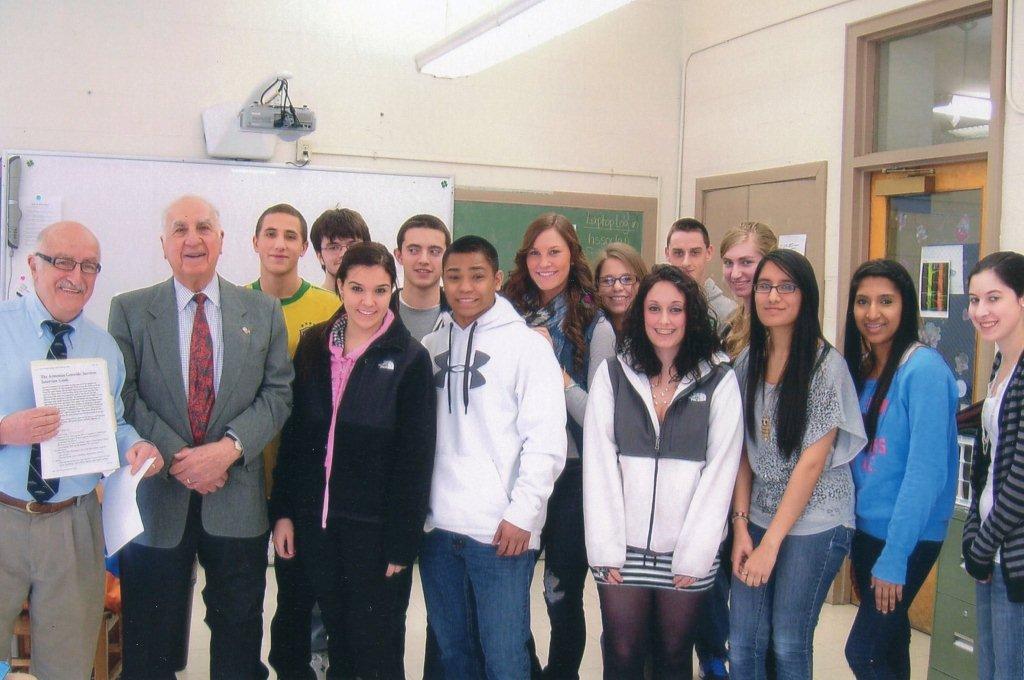Students throughout the Merrimack Valley have not only shown a huge interest in Armenian Genocide education, they’re attending commemorations and theatrical productions and lobbying for recognition with a surge of letters to their Congressmen.

Quite the contrast to three years ago when many students had a “ho-hum” attitude and knew little or nothing about the Armenian Genocide.
Much of the change has been induced by members of the Merrimack Valley Armenian Genocide Education Committee, which has been making a visible presence inside area high schools and colleges.
“We’re making big strides,” said Dro Kanayan, chairman. “Compared to what it was, say, three years ago, these students are turning into activists and goodwill ambassadors for the Armenian people. Their teachers have been mobilized on the issues.”
At Wilmington High, students are ingrained in a curriculum provided by “Facing History and Ourselves.” There’s been such a demand for the class that a waiting list is in effect.
Students have attended Armenian Genocide observances throughout Merrimack Valley, gone to lectures in Boston, and are preparing to see the new theatrical production by Joyce Van Dyke titled “Deported.”
Each was asked to prepare a paper about their feelings on genocides, and some of their thoughts are worthy of publication.
“Stop living in a world of denial,” wrote John Grealish and Derek Mayo. “You’re only going to put your soul on trial. All the steps you can’t retrace. Extermination of an entire race.”
They went on to compose a narrative listing other abused nations.
Why remember the Armenians?
“Because they were forced to live with a scar for nearly 100 years,” wrote Zach Anderson. “They were a martyred nation and many countries like the United States haven’t recognized this act of atrocity.”
“Turkey wants to move past its crimes and not have the country appear in a negative light,” Krishna Raval reported. “It’s obvious that what happened to the Armenians in 1915 was genocide.”
At Haverhill High, students were so touched about the Armenian Genocide during a presentation last year that they launched a Human Rights Club that meets after school.
One student indicated the club’s goal was to make a positive difference in the world. Members are raising funds to join Habitat for Humanity in building a home inside a developing country. The country of Armenia is among those being considered.
Chelmsford High School devoted six hours to Armenian Genocide talks, compounded by a panel discussion. Four classes reaped the benefits. Instructors there say that it’s become such a popular class, it’s difficult to sustain the demand.
Meanwhile, attention has also turned to area colleges. UMass Lowell will present a panel discussion on April 24 and Northern Essex Community College (Haverhill) opted for both a panel discussion featuring other maligned countries and an address to members of a Contemporary Affairs Club.
“My department is sponsoring an effort to have students write about important human rights issues,” said faculty advisor Steve Russell. “We consider it a very vital theme on campus.”
Meanwhile, schools outside the Merrimack Valley have also expressed a solid interest. Both Melrose and Newton South have visits lined up.
“The reason why it’s proven so successful is the diversity of our presentation,” adds Albert Movsesian, a principal speaker. “We offer a blend. Genocide is usually intertwined with the history and culture of the Armenians. It’s important to review the heritage and give students a sense of feel for our country—how we persevered after the genocide and what’s being done to recognize it.”
Despite a Turkish lobby in some communities, no resistance has been waved at the genocide programs, much less from the school administration. Many classrooms are displaying Armenian Genocide posters and one bold room even suspended a photo of Talaat Pasha, the perpetrator of the Armenian crimes in 1915.
After one unsuccessful attempt to get a postage stamp minted by the U.S. government, another is being made by the students, who appear relentless in their efforts to invoke justice for the Armenian people.
“With all the violence that’s taking place throughout the world today, education is a vital defense mechanism,” said Wilmington teachers Lisa Joy Desberg and Maura Tucker. “These students want to make a difference. Hearing these testimonies from the outside has a dire effect upon them.”
In some school systems, having an Armenian administrator or teacher onboard has facilitated the visit. Church pastors have also been invited to participate, along with other community activists. Books on the Armenian Genocide have been donated to school libraries.
“Hopefully, what we’re doing in Merrimack Valley will have a ripple effect throughout the country,” added Kanayan. “Our work is just beginning.”


Be the first to comment